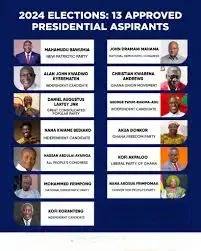As Ghana heads to the polls this year, the political atmosphere is charged with anticipation, speculation, and debate. Elections in Ghana are often closely contested, reflecting the country's vibrant democracy. This year is no exception, with the major political parties, the New Patriotic Party (NPP) and the National Democratic Congress (NDC), at the forefront of the contest. Here’s an analysis of the factors that could influence the outcome.
The Key Players
The New Patriotic Party (NPP):
As the incumbent party, the NPP’s performance in government will be a critical factor. Their campaign is expected to focus on achievements in infrastructure, education (particularly the Free Senior High School initiative), and economic policies.
The choice of their presidential candidate will also be pivotal. A candidate perceived as a unifier with strong grassroots appeal may bolster their chances.
The National Democratic Congress (NDC):
The NDC, as the main opposition party, will likely emphasize issues such as unemployment, cost of living, and perceived governance lapses under the NPP.
The popularity of their candidate and the party’s ability to mobilize voters across all regions will be decisive in their bid to return to power.
Key Issues for Voters
Economic Conditions:
Ghana’s economy has faced significant challenges, including inflation and currency depreciation. Voters will scrutinize each party’s plans for economic recovery and stability.
Youth Unemployment:
With a growing young population, job creation remains a top priority. Parties that convincingly address this issue may sway undecided voters.
Corruption and Governance:
Anti-corruption efforts and transparency in governance are perennial concerns. Voters will be evaluating the track record of both parties in addressing these issues.
Infrastructure Development:
Roads, healthcare facilities, and energy projects often dominate election discussions. Parties’ promises and past performance in delivering such projects will influence voter decisions.
The Role of Regional Dynamics
Ghana’s regional voting patterns are often crucial in determining election outcomes. Swing regions, such as the Central and Greater Accra regions, will receive significant attention from both parties. Winning these regions could be the key to securing victory.
The Influence of Technology
This year, digital platforms are expected to play a more prominent role in campaign strategies. Social media, in particular, is a battleground for reaching young voters and shaping public opinion.
Conclusion
Predicting the outcome of Ghana’s elections is always challenging due to the dynamic and competitive nature of its political landscape. The winner will likely be determined by which party can effectively address the pressing concerns of Ghanaians while inspiring confidence in their vision for the future. As the election day approaches, the debates, campaigns, and voter sentiments will reveal much about the direction Ghana chooses to take.



No comments yet
Be the first to share your thoughts!